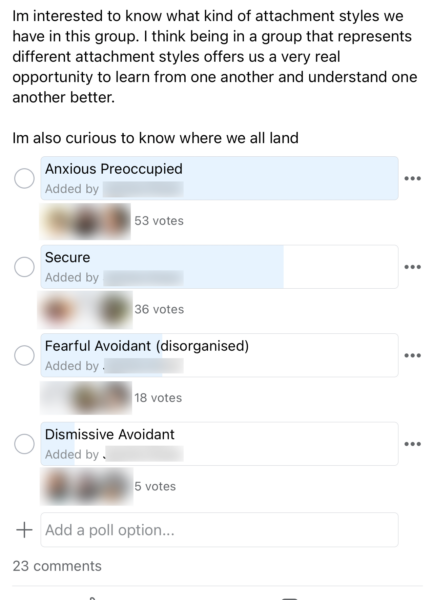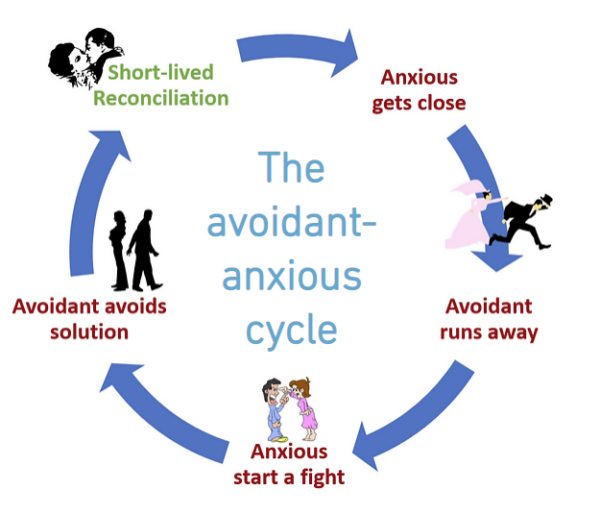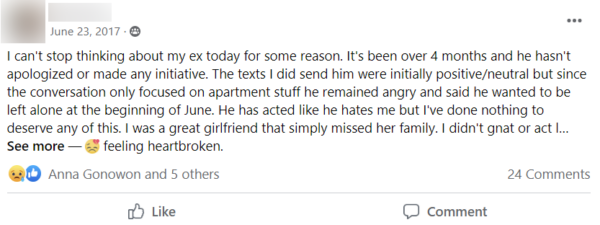Today we’re going to talk about why dumpers act so cold after a breakup. Specifically, I’d like to focus on why they demonize you and make you out to be the bad guy when they themselves were the one to break up with you.
In all, I think the best place to start is by looking at the following topics,
- Having a discussion on what constitutes “cold behaviors”
- How avoidant attachment style tends to factor into this
- Why any anxious behavior from you can set them off even more
- Taking a good look at anger as it relates to their own self validation
Let’s begin!

What Are Your Chances of Getting Your Ex Boyfriend Back?
Take the quizDefining “Cold Behaviors”
So, before we start psychoanalyzing dumper behaviors I think a good place to start would be defining what we’re really talking about when we talk about “cold” behavior.
I’ve been on the record many times saying that close to 90% of our clients are the dumpees in relationships.
I feel very confident that we’ve seen enough “cold” behaviors from them to warrant a discussion.
So, for reference any time I’m talking about a dumpers cold behavior after a breakup I’m usually talking about the following things,
- Them suddenly ghosting you
- Them giving you mixed signals (in a negative way.)
- Them getting angry with you
For many of our clients it’s a difficult puzzle to solve. For us, we’ve seen it so much and have studied the “why” so much that it’s actually comically simple for why they are being cold.
Let’s start first with attachment styles.
How The Avoidant Attachment Style Factors Into This
Alright so the first two things on our “cold behavior” list were what?
Them ghosting you
Them giving you mixed signals
Turns out both of those types of behaviors can be explained with the avoidant attachment style. Now, I get a lot of criticism on YouTube specifically for only putting my focus on avoidant attachment individuals but can you blame me?
Most of our clients say their exes have this attachment style,
So, what is the avoidant attachment style?
Well, officially the definition from Web MD reads as follows,
Avoidant attachment is an attachment style a child develops when their parent or main caretaker doesn’t show care or responsiveness past providing essentials like food and shelter. The child disregards their own struggles and needs in order to maintain peace and keep their caregiver close by
But that’s the thing. Technically this definition looks at what caused the avoidant attachment style. It doesn’t really cover the symptoms of it when it comes to relationships.
Luckily, I can do that for you.
Avoidant Attachments In Relationships: Value their own independence so much that any time anyone comes and threatens that independence they lash out by either arguing with them or more commonly, leaving the relationship
Starting to sound familiar?
Now, where this factors in for us actually revolves around the anxious and avoidant relationship trap.
The Anxious And Avoidant Relationship Trap
Above I established that most of the clients exes that we’ve studied have avoidant attachment styles.

What Are Your Chances of Getting Your Ex Boyfriend Back?
Take the quizOn the other hand, most of our clients have anxious attachment styles,
So, this is relevant because often what can “create” cold behavior from an ex is being triggered by an anxious person. The avoidant core wound revolves around independence. The anxious persons core wound revolves around being left alone.
So, when the avoidant pushes away because they want their independence back the anxious person gets triggered because they feel like the avoidant person is going to leave them forever.
The result is this vicious cycle.
- The anxious person gets close
- The avoidant person gets triggered and runs away
- The anxious person starts a fight
- The avoidant avoids the solution
- There’s a short term reconciliation
- The cycle starts again
Now, what’s interesting about this is it kind of explains both the avoidant being cold and ghosting (the running away phase) and the mixed signal phase (the short term reconciliation.)
Of course, making matters a tad more complicated this can occur on a macro level or even a micro level.
- Macro Level (It’s the story of the entire relationship)
- Micro Level (It’s the story of a singular fight and how it gets resolved within a relationship)
It’s best to view these interactions as similar to a russian fibonacci doll,
It’s symptomatic of a greater problem in the fact that both attachment styles are insecure and really what both of them need to do is start surrounding themselves with more secure ones so they can learn how to become more secure themselves.
Of course, one thing that we haven’t really explained yet is how the anger component of “cold behavior” comes into play.
Anger = A Way To Validate Themselves
A few years ago Coach Anna and I did a video for the YouTube channel and she brought up a really interesting point revolving around anger and how it can almost have “positive characteristics.”
Sounds weird, right?
Well, to quote her exactly,
When I say that anger has positive characteristics, I mean that when someone says, “You’re stupid,” they’re actually implying I’m smart. You’re selfish, you’re selfish means I’m generous. You’re behaving like a child means I’m behaving like an adult. This is why people get angry very easily and they stay angry because it feels good and it’s personally validating.
I think this is especially interesting to study after a breakup because we know that no matter your exes attachment style it’s going to have a profound negative impact.
So, demonizing you.
Making YOU the bad guy is better than making themselves the bad guy. To quote Anna again,
Anger often protects the angry person because if the person’s angry, they’re protecting themselves from feeling sadness or shame. So anger is a defense mechanism.
So, here’s my argument. When you are looking at why the dumper is acting cold towards you one possible explanation is that it might be a defense mechanism to stave off feeling sadness or shame.
Remember, human beings are very pain averse and that’s doubly true for emotional pain. So, rather than look back at the failed relationship they would rather paint you as the cause of its demise even if it’s not true.

What Are Your Chances of Getting Your Ex Boyfriend Back?
Take the quizEvery day in our private Facebook group we get questions revolving around an exes anger like this one (that we admittedly got quite a few years ago),
“I can’t stop thinking about my ex today for some reason. It’s been over 4 months and he hasn’t apologized or made any initiative. The texts I did send him were initially positive/neutral but since the conversation only focused on apartment stuff he remained angry and said he wanted to be left alone at the beginning of June. He has acted like he hates me but I’ve done nothing to deserve any of this. I was a great girlfriend that simply missed her family.”
So, here we have the classic cold behavior signs.
- He’s ignored her (ghosting)
- He’s been somewhat positive in a few texts (mixed signals)
- He’s acted like he hates her (angry)
Now, I’m particularly familiar with this persons situation because they ended up becoming a moderator of our private support group.
After hearing the clients perspective on the breakup. She did absolutely nothing wrong and yet she was painted as the “bad guy” by her ex boyfriend.
Why?
Well, most likely because it’s a whole lot easier for the guy to deflect blame onto her so he doesn’t have to take responsibility.
Here’s the point I’m trying to arrive at.
Most anger you see dumpers exhibit immediately post breakup is a defense mechanism. Add in the fact that we teach our clients to let the breakup “make them” as opposed to “break them.” There’s a nuanced layer where the dumper actually grows more angry because the dumpee isn’t reacting the way they should.
The prevailing belief most dumpers have is that because they dumped you they should be placed on this pedastal and worshipped as the one the got away.
When that narrative doesn’t come true they often freak out and get even angrier and who better to blame than you, the source of their pain.




